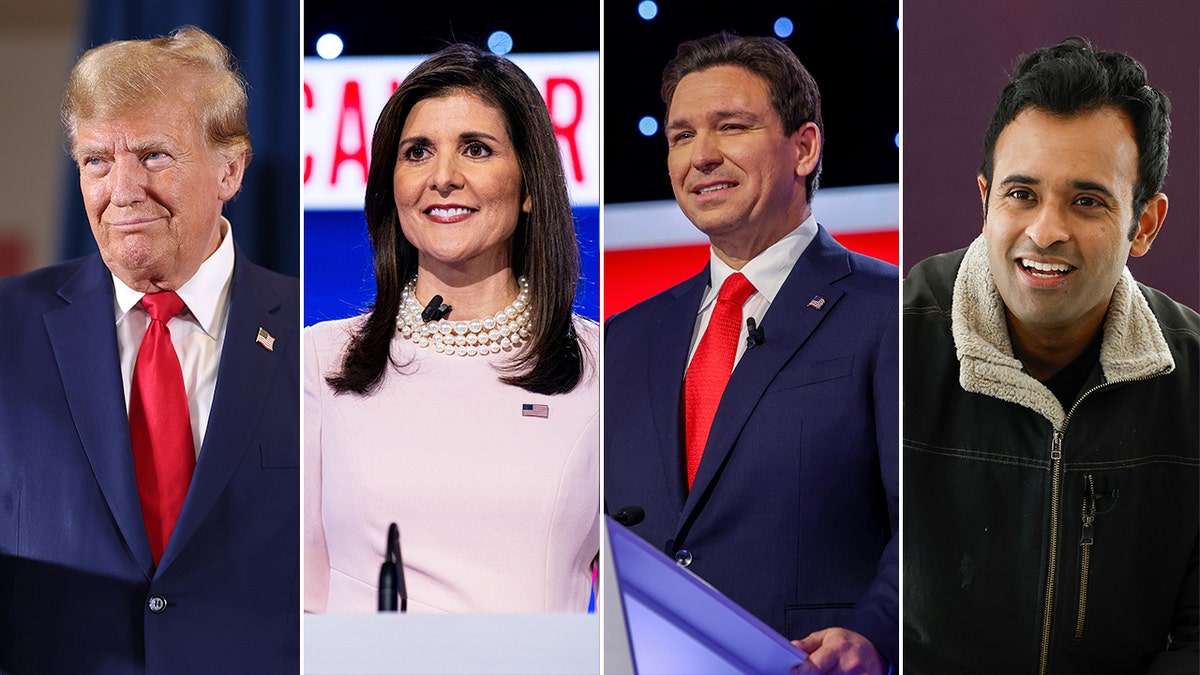
Caucusgoers are heading out in freezing temperatures to cast the first votes of the 2024 election. Snowfall and temperatures have set new records in the days leading up to the Iowa caucuses.
“I haven’t ever experienced a minus 15 degrees in my life,” Florida Gov. Ron DeSantis said at an event in Altoona last week.
Former United Nations Ambassador Nikki Haley told Iowans attending an event in Ankeny, “It’s going to be so cold. Like, I don’t even know what minus 15 is.”
“That was a hell of a trip I just took,” former President Donald Trump told a Clinton rally. “The snow came and the rain. I saw everything.”
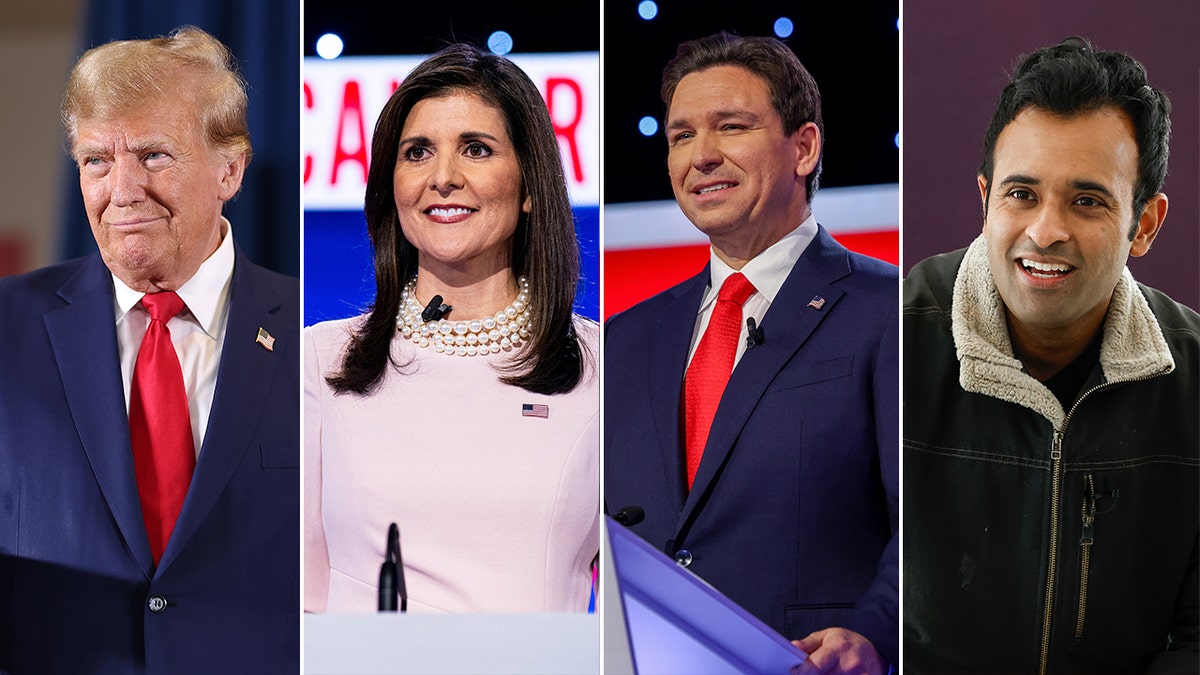
Former President Donald Trump, former U.N. Ambassador Nikki Haley, Florida Gov. Ron DeSantis and entrepreneur Vivek Ramaswamy are vying for the Republican presidential nomination. (Getty Images)
LIVE BLOG: TRUMP, HALEY, DESANTIS, FACE OFF AT IOWA CAUCUSES IN GOP 2024 PRESIDENTIAL RACE
The winter storm has forced the candidates to adjust their schedules. Trump had to cancel several events and held a tele-rally. Haley also held telephone town halls after a series of cancellations.
“I have to say, I am definitely not in South Carolina anymore. This is unbelievable,” she told attendees at a Waukee event.
DeSantis also canceled events and was forced to readjust his schedule due to the weather. Vivek Ramaswamy has criticized the other candidates for cancellations, despite canceling his own events.
“Some saw a snowstorm, canceled events in northwest Iowa,” Ramaswamy said at a Sioux City rally, just one day before canceling his events in Coralville and Burlington. “We got four events. We’re keeping them intact. You can’t handle the snow, you’re not ready for Xi Jinping. That’s my view.”
Ahead of our interview with Ramaswamy in Dallas County, the Republican candidate’s bus was unable to make the drive from Sioux City to Des Moines because of black ice.
With candidates already getting less voter interaction and threatening cold temperatures, some worry it could impact turnout.
“It’s a little concerning for some of us who’ve been at this process a long time, because we have some seniors who vote. And sometimes when the weather is bad, they don’t vote,” former Iowa Republican Party Co-Chair David Oman said. “I’m hopeful and have been thinking, up until just now with the weather, that we might have a record turnout.”
Early voting or mail-in ballots are not an option for most Republican caucusgoers. Instead, they must brave the elements to attend in person.
“The caucus process and how it differs from a primary is that you actually have to be at the place of the precinct caucus at a specific time,” State Historical Society of Iowa historian Leo Landis said.
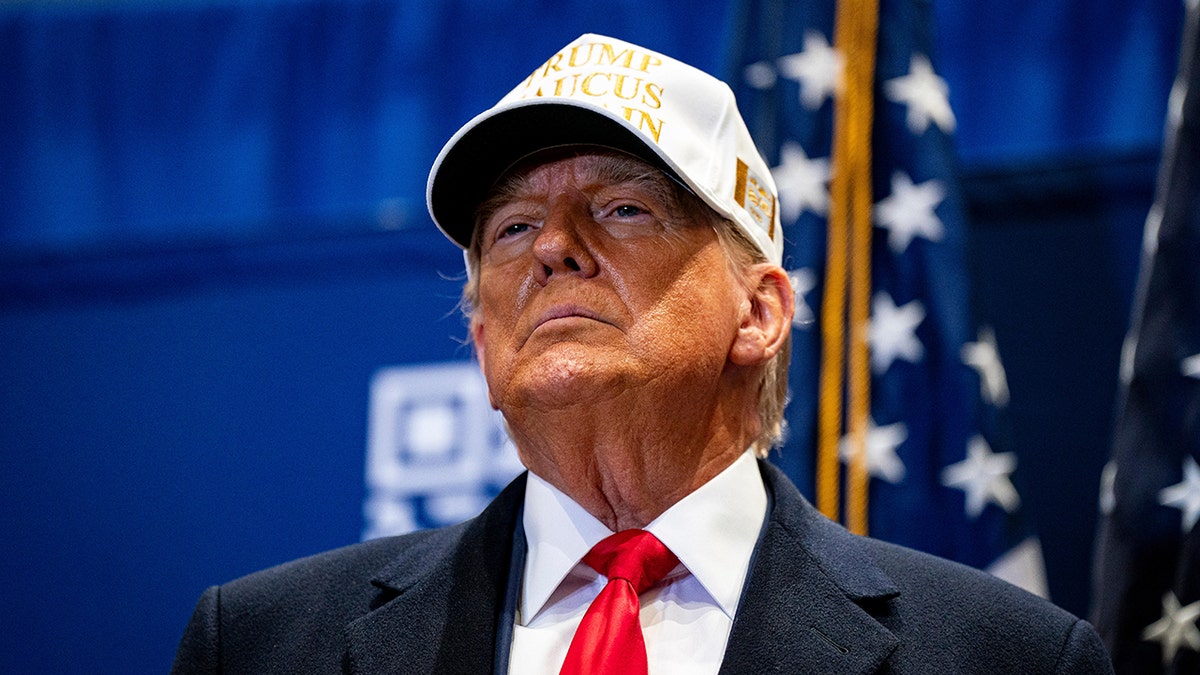
Donald Trump arrives for a campaign event at Simpson College in Indianola, Iowa, on Sunday, Jan. 14, 2024. (Al Drago/Bloomberg via Getty Images)
The caucuses are run by political parties, while primaries are usually run by the state. Iowa Republicans have more than 1,600 locations.
“People come together and sit in a room, or a classroom or a civic building and talk about the campaign,” Oman said.
Candidate representatives often give speeches in an attempt to sway caucusgoers who may still be undecided. Caucusgoers then cast their votes using a secret ballot.
“Sometimes they’re preprinted and you might check a name, or sometimes you just write the name on a slip of paper,” Landis said. “It’s the oldest way that nomination processes took place, was neighbors gathering, promoting a candidate or a cause that they thought was important and trying to convince their neighbors.”
They also select delegates for the county conventions. It’s the beginning of a multi-tiered process that involves electing delegates to attend the Republican National Convention. Those individuals are bound to back the winner of the GOP caucuses in Milwaukee this summer. But that was not always the case. The 2012 Iowa caucuses led to major changes for Republicans.
Mitt Romney had initially appeared to defeat Rick Santorum.
“In 2012, we had a slight glitch where Mitt Romney won by eight votes,” Oman said.
Around two weeks after the results were announced, a new tally showed Santorum had more votes than Romney.
YOUR QUICK GUIDE TO THE IOWA CAUCUSES AND WHAT TO EXPECT THIS YEAR
The eventual winner would change once again during the Republican National Convention. Since the delegates were not bound to vote for Santorum or Romney at the convention, they were able to switch their preference to Texas Rep. Ron Paul.
“Rep. Paul saw how contested conventions could lead to a different nomination,” Landis said. “Even though delegates are supposedly locked in, the nomination at the convention shifted.”
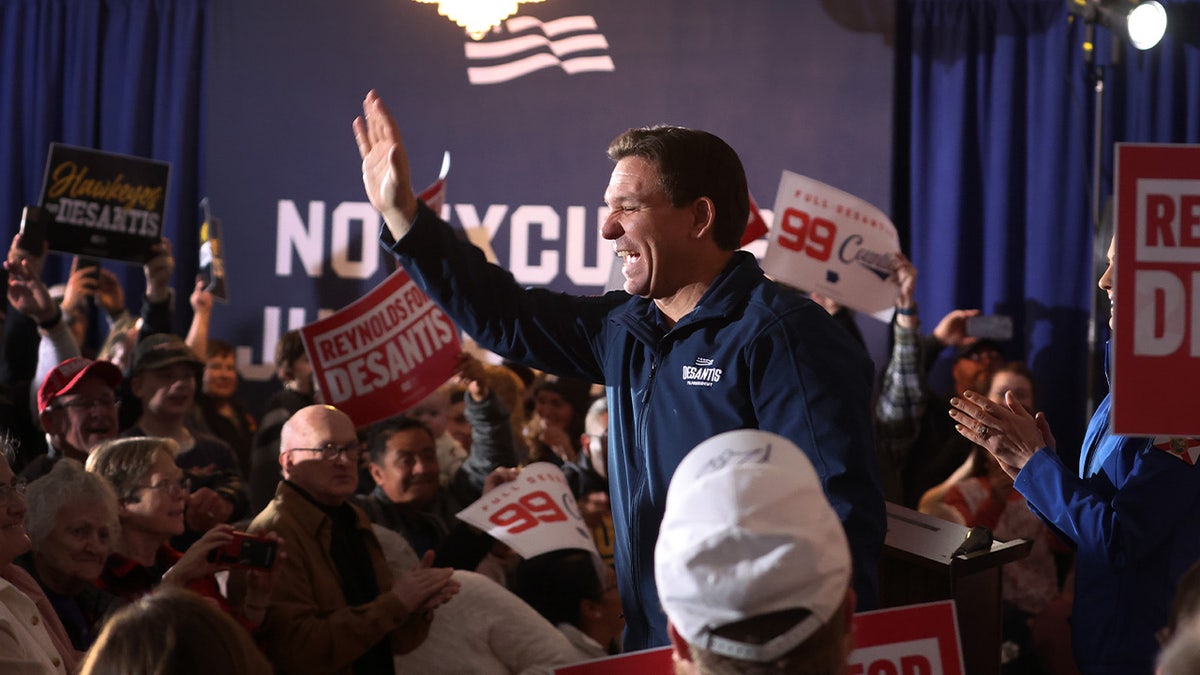
Florida Gov. Ron DeSantis arrives for a campaign rally at the Thunderdome on Dec. 2, 2023, in Newton, Iowa. (Scott Olson/Getty Images)
For the 2016 election cycle, the Republican National Committee made it so delegates were bound to the candidate they were allocated to.
“That was something that you did have, especially in the 1970s, where the Reagan versus Ford campaign really wasn’t locked up till the national convention,” Landis said.
Democrats do not have binding delegates but have changed their process dramatically after issues plagued the 2020 caucuses.
“You can’t talk about the 2020 Democratic nomination process without saying it was a debacle,” Landis said.
The party was unable to determine a winner due to glitches with the app it used to record and report results.
“They didn’t report any votes because they didn’t have any votes,” Oman said.
They eventually released a tally showing former South Bend, Indiana, Mayor Pete Buttigieg had narrowly defeated Vermont Sen. Bernie Sanders.
“With the three-day wait and maybe having some issues about where the votes counted or the caucus delegates counted accurately really did reflect poorly on the Iowa Democratic Party,” Landis said.
While some criticize the process on both sides, Iowans say the first-in-the-nation status helps boost voter turnout.
“Certainly it has limitations, but it’s not as if primaries bring out more than 50% of the voters. So it really is the engaged electorate who’s participating in caucuses,” Landis said.
Whether Democrats make Iowa first once again in 2028 is still unclear.
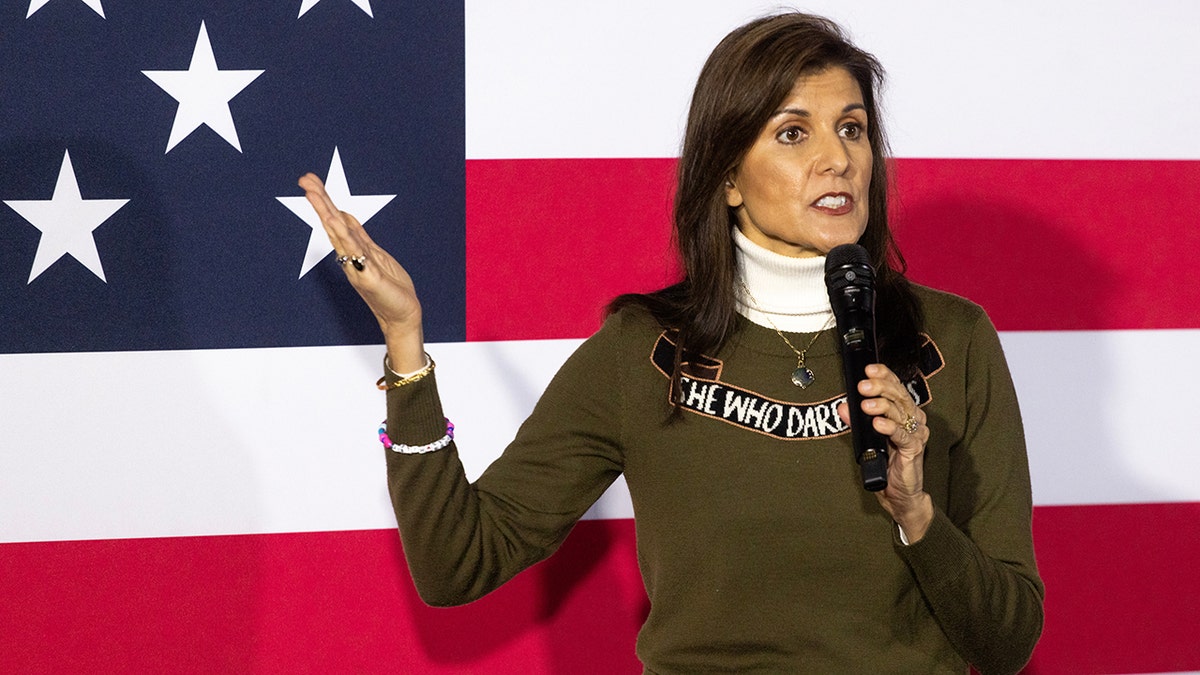
Nikki Haley speaks during a campaign event at The James Theater in Iowa City on Saturday, Jan. 13, 2024. (Alex Scott/Bloomberg via Getty Images)
“I think it’s going to be a hard, hard push for the Iowa Democratic Party to get that back,” Landis said.
Democrats were the first to make Iowa the first in the nation event. Republicans followed suit in 1976.
“In 1972, you’ve got Edmund Muskie versus George McGovern, and Muskie was the senator from Maine, seen as the frontrunner,” Landis said.
South Dakota Sen. George McGovern campaigned heavily in Iowa. While he did not win the caucuses, he did much better than expected and eventually became the 1972 Democratic nominee.
“McGovern used Iowa to prove he was a viable candidate,” Landis said. “Then in 1976, it really does become a national event for candidates.”
While the winner in Iowa does not always determine the nominee, it does give candidates momentum. In 1980, George H.W. Bush won the caucuses and went on to be Ronald Reagan’s vice president. He was eventually elected to the White House in 1988. That year, Bob Dole won the caucuses with the help of his Iowa-native campaign manager.
“We take politics very seriously because this process has worked for almost two generations,” Oman said.
CLICK HERE TO GET THE FOX NEWS APP
While the polls have Trump in the lead, Iowa caucusgoers could help another candidate get the boost they need to either win the nomination or other top political positions.
“You’ve got these stories that sometimes get overlooked in Iowa’s role,” Landis said. “They show who are good candidates with good messages, with good organizations, and might be a great candidate on a national stage, too.”








